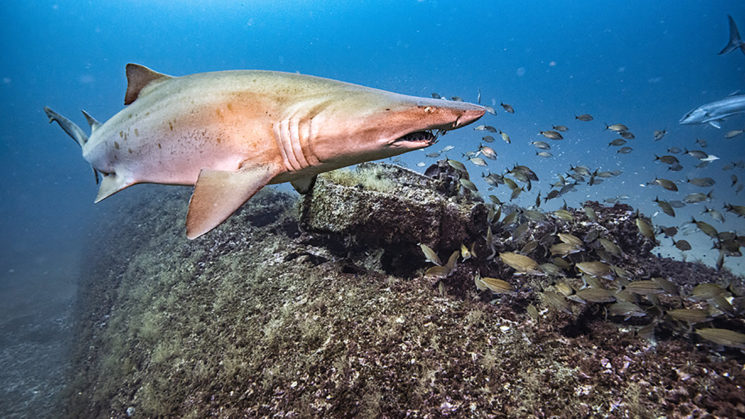
Above: A sand tiger shark swims over the SS Tarpon shipwreck. Photo courtesy of NOAA.
Less than a year after the North Carolina Aquariums launched the Spot a Shark USA citizen science program, the initial findings already could play a significant role in the protection of the sand tiger shark. A globally designated vulnerable species, sand tigers are linked to healthy aquatic ecosystems.
Under the program, divers submit both new and historical shark images to the Spot A Shark USA website, providing as much information about the image as possible. Behind the scenes, researchers map the locations of each shark.
The citizen scientist photographs of sand tiger sharks suggest that female sand tiger sharks exhibit “site fidelity” — returning to the same locations over time. Building a photographic record can help to identify habitats that the imperiled species requires.
“Six female sand tiger sharks were photographed and re-photographed at the same or nearby shipwrecks located off the coast of North Carolina over a period of time ranging from a few months to six years,” says Avery Paxton, lead researcher for the project. “This indicates shipwrecks are potentially critical habitats for sand tiger sharks and worthy of further research.”
The preliminary findings add to a growing body of evidence that shipwrecks are potentially critical habitat for the species and could help facilitate conservation of sand tiger sharks, whose estimated population in the United States have declined by more than 75%.
Some researchers believe this highly migratory species uses the North Carolina wrecks as “rest stops” on their journey from New England to Florida. Another hypothesis suggests the shipwrecks may be even more valuable to sand tigers as key reproductive habitats or even as year-round habitats.
“It is a scientific process, and we have just started chipping at the surface,” says Paxton. “That’s why it is so important to share this information to further future research efforts.”
Bringing researchers and divers around the world to the table may help solve complex mysteries of the sand tiger shark and facilitate conservation of the iconic species — and ultimately enable its recovery.
Read the full study in Ecology.
Adapted from a press release from the North Carolina Aquarium at Pine Knoll Shores.
##